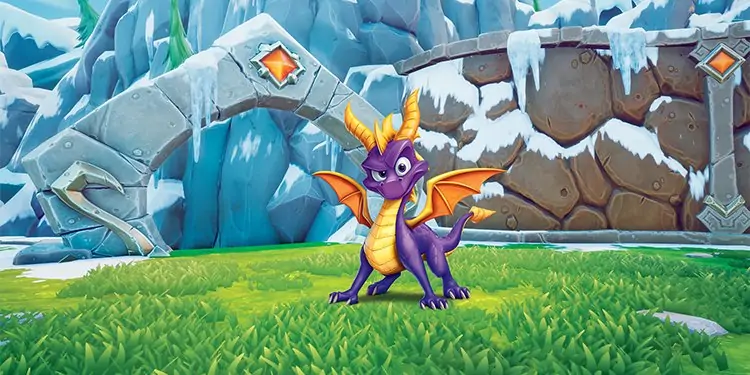Spyro the Dragon debuted in 1998 for PlayStation by Insomniac Games. Four years later, the reputed developer moved on to a more action-oriented platformer, the Ratchet & Clank series.
After leaving Spyro behind, various studios took their chances with the franchise. Finally, in 2008, Activision bought the rights from Sony and released a remastered collection.
So far, we’ve seen 14 Spyro entries. That includes nine core games, one reboot, three spin-offs, and one collection.
The Spyro Game Series
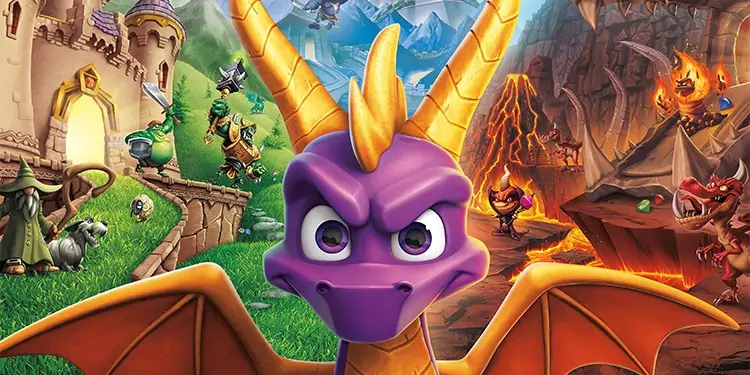
Spyro games are often forgotten or unknown, sadly. Many still believe Spyro is one of the most iconic platforming video-game series.
These games follow Spyro the Dragon, a young dragon with purple skin.
The original series by Insomniac also introduced Sparx, a dragonfly companion that can protect Spyro from damage.
Another side character is Hunter the Cheetah, Spyro’s loyal friend. Moneybags is a bear obsessed with money and often asks Spyro for gems to let him pass. Lastly, Zoe is a fairy who represents the checkpoint.
Then, the setting presents various magical realms where dragons and fairies live.
The gameplay has remained similar throughout the year. These are 3D platforming games. You play as Spyro through a series of levels, collect gems, defeat enemies with simple attacks, and complete the objectives.
Lastly, we found four “eras” within the Spyro games timeline. First, there’s the Insomniac trilogy. Then comes a series of games coming out from different developers. The third era is a reboot, and, finally, the Activision era has only released a remastered bundle.
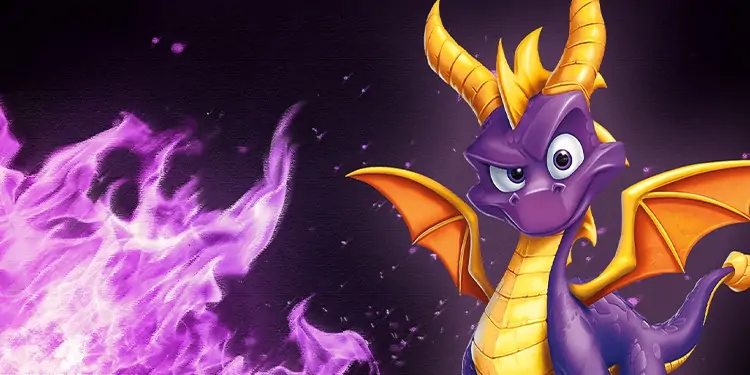
Insomniac Spyro Trilogy Era
Spyro the Dragon – 1998
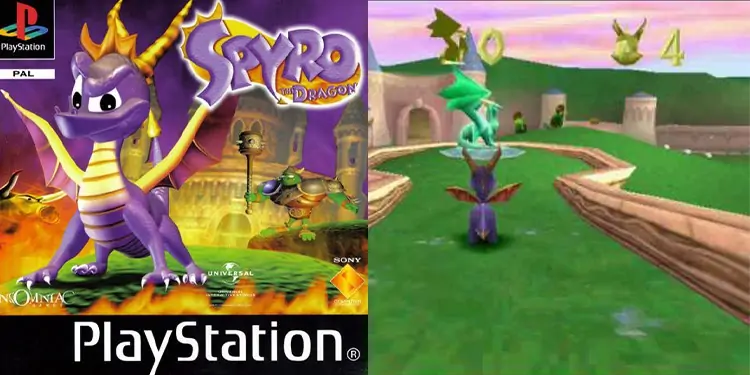
In 1996, three games debuted that solidified the 3D platforming games: Super Mario 64, Crash Bandicoot, and Bubsy 3D.
The 1998 PlayStation title became a member of the new hit genre. It did nothing new, but it cemented the PlayStation’s reputation for its original IPs.
The first entry follows Spyro and Sparx. They travel through the Dragon Realms to defeat Gnasty Gnorc. The enemy turned all other dragons into crystals, and Spyro must save his friends on a series of 3D levels.
Notably, the game had an open-ended design. Levels were vast and full of collectibles, mazes, and key items. Spyro needed his abilities to go forward: fire breath, a frontal charge, and gliding.
Spyro 2: Ripto’s Rage! – 1999
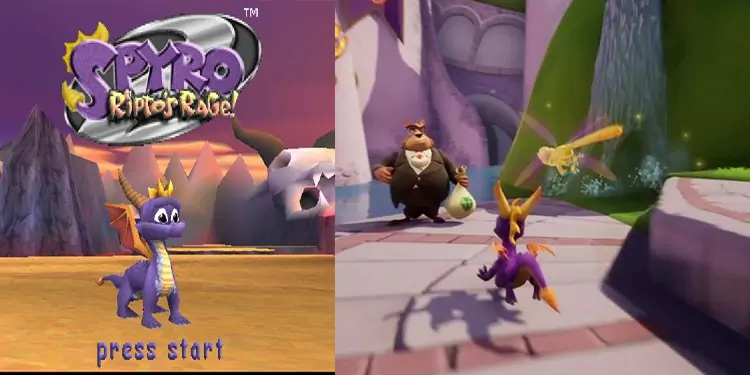
The sequel debuted in 1998 for PlayStation. In Europe, the game’s name is Gateway to Glimmer.
Notably, it’s one of the first PlayStation titles to change details between rendered objects. Other than that, Spyro came back with a new design but similar gameplay.
The title has three main hub worlds, each with portals to different realms. Spyro has to get the talisman on every domain to finish the game. Also, he can complete secondary quests for other NPCs.
Spyro: Year of the Dragon – 2000
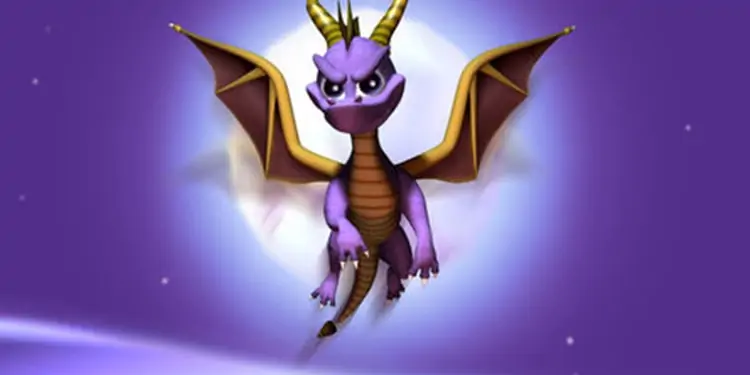
The last entry by Insomniac Games debuted for PlayStation 2 in the year 2000.
This title follows Spyro on a quest to recover 150 magical eggs from an evil Witch. The search takes the hero towards 37 platforming levels.
Compared to previous games, it improves graphics, performance, and music. Also, it introduced mini-games, more side characters, and simple puzzles.
Several Studios Era
Spyro: Season of Ice – 2001 (Spin-off)
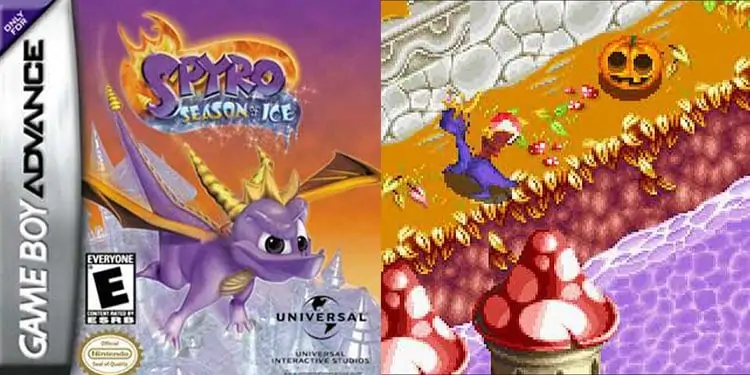
Season of Ice debuted for Game Boy Advance in 2001. It’s an alternate sequel to the previous games.
The title follows Spyro releasing fairies from their icy prisons. He searches various realms, collects gems, and travels through the domains via fairy portals.
Spyro 2: Season of Flame – 2002 (Spin-off)
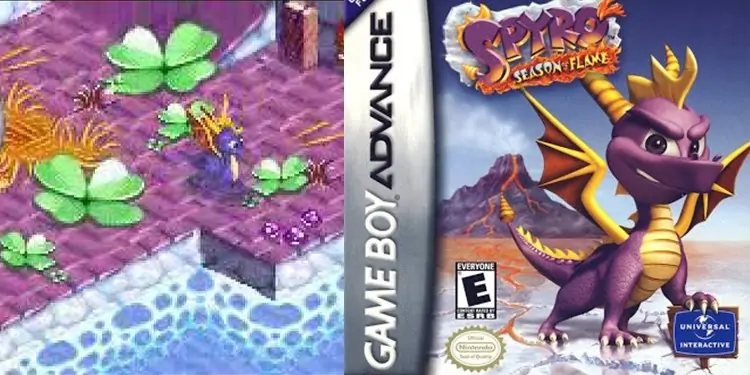
Season of Flame is the second Spyro game by Digital Eclipse. The platformer debuted in 2002 for Game Boy Advance.
The fifth series entry revolves around the abduction of the fireflies by Rhynocs. It causes the dragons the ability to breathe fire, so Spyro must rescue the magical creatures.
However, Spyro’s new ability is an ice breath. Also, after rescuing different fireflies, he regains his fire breathing ability. Lastly, several in-game items and locations increase Spyro’s abilities.
Spyro: Enter the Dragonfly – 2002
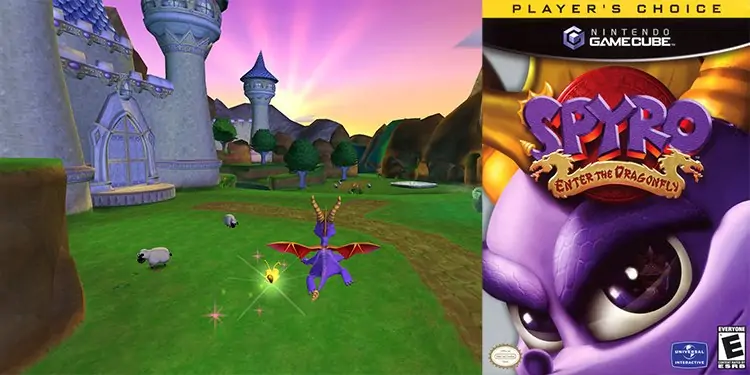
Enter the Dragonfly debuted in 2002 for PlayStation 2 and GameCube. Check Six Studios and Equinoxe Digital Entertainment are the new developers, whereas Universal Interactive’s publisher.
The entry is similar to previous Spyro games. It adds various breath attacks (a trapping bubble, ice, electric, and fire). Spyro learns these abilities from a dragon statue in his homeworld.
The plot happens after Year of the Dragon. During the Grand Dragon Parade, Ripto attacks the Dragon realm and causes the dragonflies to flee. Spyro has to travel the domain to search for the fairies once again.
Spyro: Attack of the Rhynocs – 2003
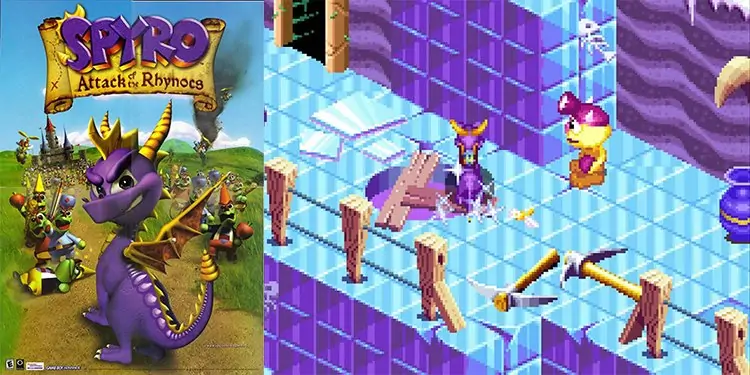
The next entry by Digital Eclipse debuted for Game Boy Advance in 2003. It’s the last in the series under Universal Interactive publishing, as the label disappeared shortly after.
This game plays similar to the previous handheld entries. Then, the plot follows Spyro and Sparx helping The Professor with new inventions that could stop Ripto.
Crash Bandicoot Purple: Ripto’s Rampage / Spyro Orange: The Cortex Conspiracy – 2004 (Cross-over Spin-off)
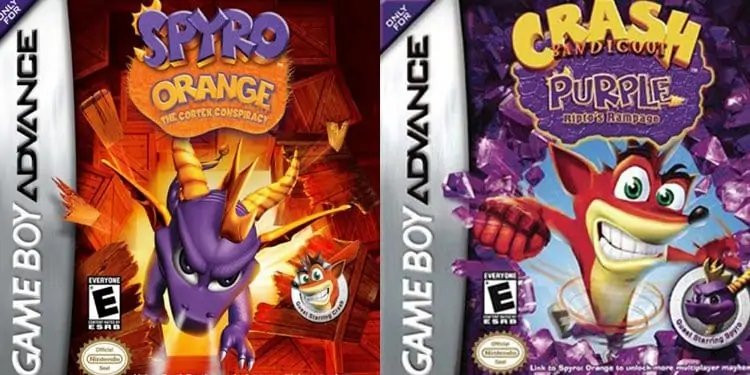
Purple & Orange is a two-piece crossover game published by Vivendi Universal Games. The studio is Vicarious Visions, and they released the pack for Game Boy Advance in 2004.
This is the tenth entry in the Crash Bandicoot series and the sixth main entry in the Spyro franchise. For both franchises, it’s the fourth entry for the handheld console.
Doctor Neo Cortex is wreaking havoc on Bandicoot and Spyro’s realms. The two heroes team up to defeat the enemy Doctor Cortex, Ripto, and their minions.
These are side-by-side side-scrolling adventures. The player controls Crash or Spyro in their respective games.
Spyro: A Hero’s Tail – 2004
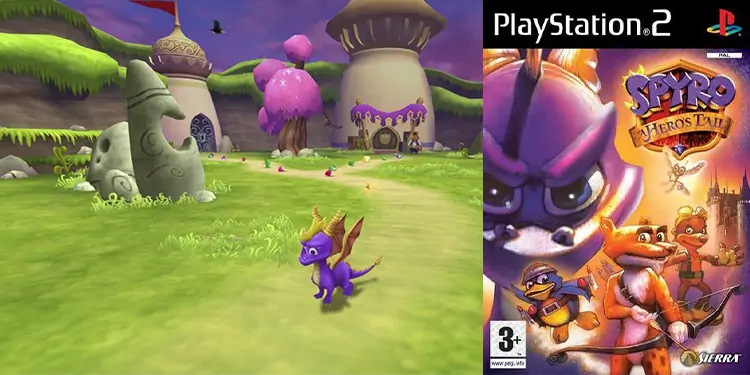
A Hero’s Tail debuted for Xbox in 2004. It also became available for PlayStation 2 and GameCube. The developer is Eurocom Entertainment Software, while Vivendi repeats as the publisher.
The game introduces Red as a new antagonist. He’s a former Dragon Elder. Spyro must defeat Red as he attempts to corrupt the realms.
The gameplay involves the typical mechanics of the series, and it includes different breathing types. Also, he has several abilities like wall kicking, swinging with his tail, a water breath attack, and ledge grabbing.
Spyro: Shadow Legacy – 2005
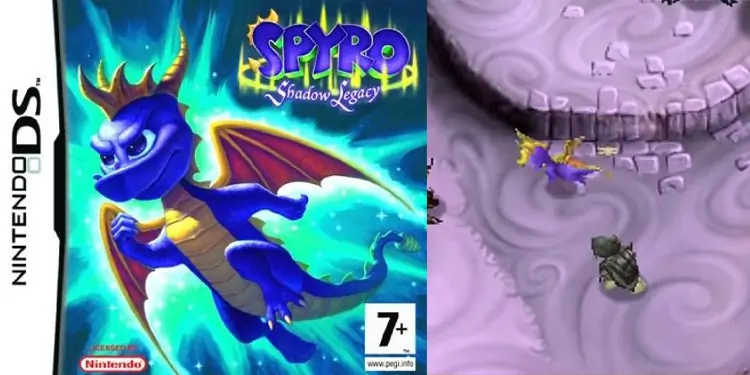
Shadow Legacy debuted in 2005 for Nintendo DS. It’s the first Spyro game for the console and the first by Amaze Games.
The title follows A Hero’s Tail’s events. Spyro and his friends are trapped within a strange dimension. They embark on an adventure to master dragon-kata and magic to rescue everyone from the domain.
Spyro can gain experience points and level up to learn new skills along the journey. There’re also side quests for additional experience points. Lastly, the player can use the DS touchpad to draw symbols and cast spells.
Reboot Era: The Legend of Spyro Trilogy
The Legend of Spyro: A New Beginning – 2006 (Reboot)
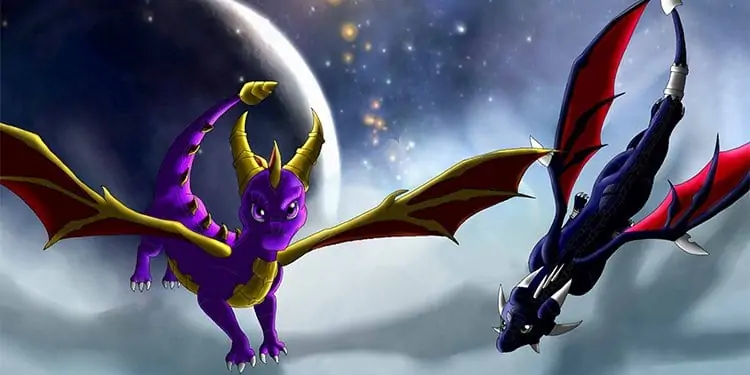
A New Beginning is a reboot of the series. It debuted as an action-adventure game by Krome Studios and Vivendi Universal Games.
The title premiered for Game Boy Advance, Game Cube, Xbox, and PlayStation 2 in 2006. Amaze Entertainment then ported the game for Nintendo DS.
This title follows an action-based formula. Spyro has several combat abilities, four breath attacks, and elemental energy blasts. Also, there’re only six main levels, a linear design, plus two rail-shooter side levels.
As for the plot, it tells a new origin story for Spyro. He’s a special dragon that came from a distant land, and he leaves the swamp to discover his lineage and the reason behind his powers.
The Legend of Spyro: The Eternal Night – 2007
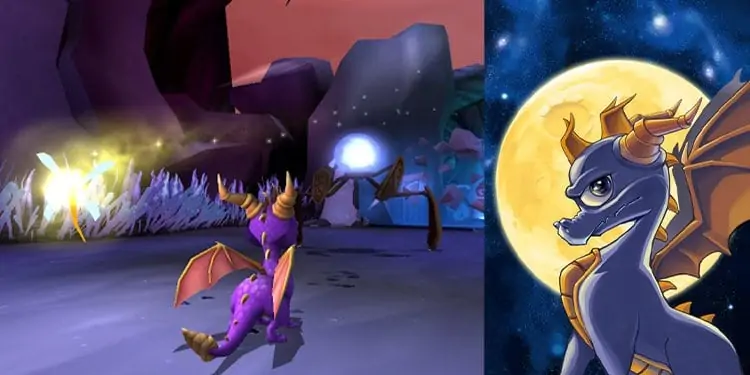
The Eternal Night is a sequel to the rebooted title, so it’s the second part of The Legend of Spyro trilogy. It debuted for PlayStation 2, Nintendo Wii, Nintendo DS, and Game Boy Advance in 2007.
The gameplay follows the formula of its predecessor. Spyro travels through a series of linear levels across multiple boss battles. As before, Spyro can learn different breath skills and has many attacks.
Additionally, the game emphasizes puzzle-solving and exploring for hidden items. Another novelty is the “Dragon Time” skill, which allows Spyro to slow-down time.
The storyline continues the previous game after defeating the black dragon Cynder. Spyro and Sparx meet a new enemy, the Dark Master, and prepare themselves to defeat him.
The Legend of Spyro: Dawn of the Dragon – 2008
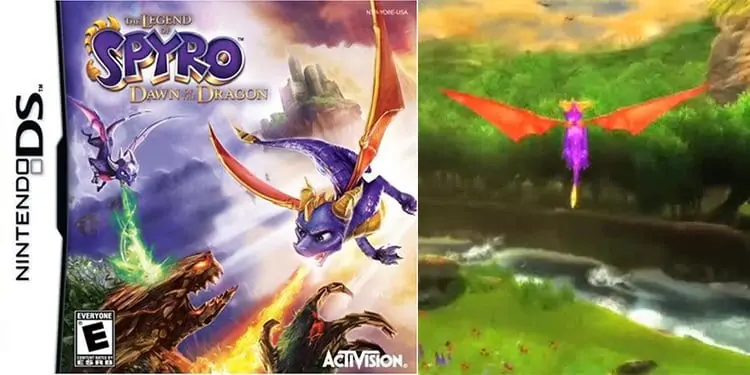
Dawn of Dragon is the next entry of The Legend of Spyro timeline. Etranges Libellules created the 2008 title for PlayStation 2, PlayStation 3, Xbox 360, Nintendo DS, and Nintendo Wii. Moreover, Activision distributed the game in North America.
The title allows Spyro to fly at any time and features a co-op mode with previous villain Cynder. Similarly, players can complete the game as Cynder or Spyro. These are the two main changes regarding gameplay.
AS in previous entries, Spyro travels through various levels to defeat the enemies and bosses linearly. Both dragons have multiple abilities, power-up gems, and Dragon-armor gear they can find and equip. Also, they can now perform melee combos, necessary to defeat the stronger elite enemies.
The plot continues with The Eternal Night’s events. Spyro and Cynder are teenagers, lost in a dark and volcanic area. They must defeat a new set of enemies and return home.
Activision era
Spyro Reignited Trilogy – 2018 (Remaster)
Activision published a new entry after a long hiatus with Toys for Bob and Iron Galaxy as the new developers.
The Reignited Trilogy brings back the original trilogy with 1080p graphics and 60fps.
The bundle debuted in 2018 for Windows, Xbox One, PlayStation 4, and Nintendo Switch.
Every Spyro Game in Chronological Order
- Spyro the Dragon – 1998
- Spyro 2: Ripto’s Rage! – 1999
- Spyro: Year of the Dragon – 2000
- Spyro: Season of Ice – 2001 (Spin-off)
- Spyro 2: Season of Flame – 2002 (Spin-off)
- Spyro: Enter the Dragonfly – 2002
- Spyro: Attack of the Rhynocs – 2003
- Crash Bandicoot Purple: Ripto’s Rampage / Spyro Orange: The Cortex Conspiracy – 2004 (Cross-over Spin-off)
- Spyro: A Hero’s Tail – 2004
- Spyro: Shadow Legacy – 2005
- The Legend of Spyro: A New Beginning – 2006 (Reboot)
- The Legend of Spyro: The Eternal Night – 2007
- The Legend of Spyro: Dawn of the Dragon – 2008
- Spyro Reignited Trilogy – 2018 (Remaster)
Will the Spyro Series Continue?
There’s nothing official on Spyro’s return yet. However, Activision has hinted at a new main entry to continue The Year of the Dragon. So far, we’ve seen 14 Spyro entries. That includes nine core games, one reboot, three spin-offs, and one collection.

